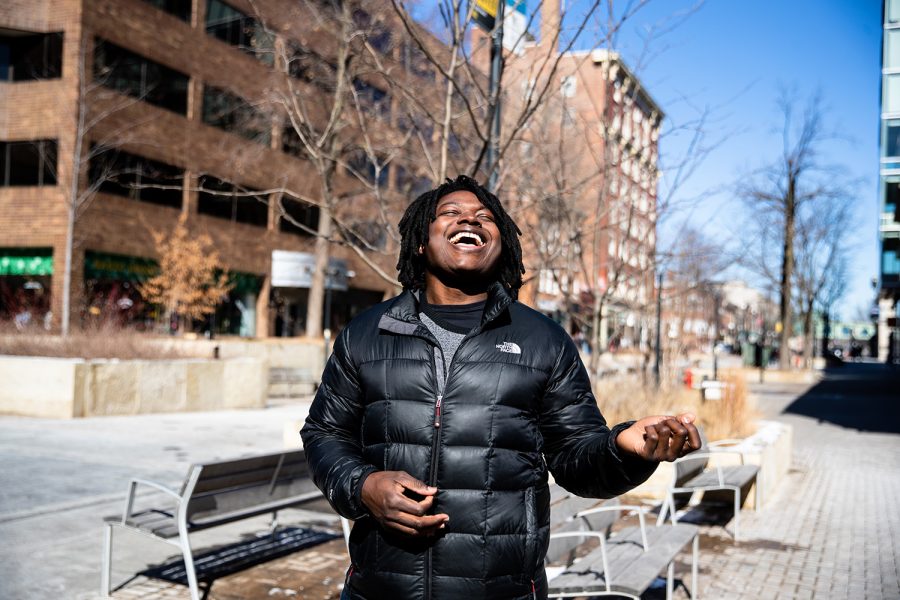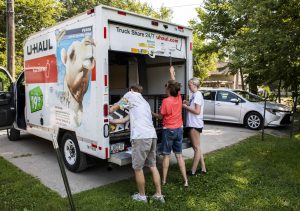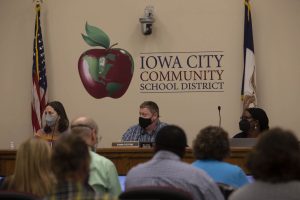Iowa, national musicians weigh in on pandemic effects
The beginning of the COVID-19 pandemic put many musicians out of work and forced them to cancel a countless number of shows. Now that many are back performing in-person shows, the effects continue to linger.
James Tutson poses for a portrait at the Ped Mall in Iowa City on Sunday, Feb. 27, 2022. Tutson is a musician from Iowa City and has appeared on The Voice.
March 1, 2022
The pandemic left many musicians facing decreased income and canceled shows. Even as many have now returned to live performances and touring, COVID-19 has continued to affect their gigs.
Jeni Grouws, lead singer of blues group Avey Grouws Band, said the pandemic forced her band to cancel a nationwide tour scheduled to take place in support of its debut album, The Devil May Care.
“September of 2019 was when I left my full-time job running two radio stations to become a full-time musician,” she said. “My timing could not have been worse. By March, I was out of work.”
Because of the tour’s cancellation, Grouws, who lives in Decorah, traveled 100 miles south to the Quad Cities to perform with the rest of the band. The group performed live streams every weekend, sleeping each night on the couch of bandmates Chris Avey and Bryan West, she said.
Grouws said that, despite the strain and stress of the long road trips paired with the inability to tour the band’s album — which she added was expensive to make —the livestream ended up helping.
“We gained literally hundreds of fans in Wales, Scotland, Ireland, Germany, Sweden, Australia, all these people in New Jersey and California — they’re all tuning in to hear our livestreams,” she said. “And they became part of our family.”
Even without a tour to support it, The Devil May Care went on to peak at No. 10 on the Billboard Blues Chart. The band’s 2021 follow-up, Tell Tale Heart, debuted at No. 7.
On top of live streams, the Avey Grouws Band played an in-person concert in Minnesota in August 2020 for people in their cars. Grouws said it was a unique experience knowing that people were there but being unable to see their faces. When a song ended, audience members would honk their horns and flash their lights instead of clapping.
The band expects to play three to five shows per week as live events become more common, but currently averages only two per week — which Grouws said has been stressful.
“All five of us play music as a full-time job, so if we’re only doing two shows a week, that’s still pretty stressful,” she said. “For us, selling merchandise has become really important.”
The pandemic has also prohibited fan interaction, which Grouws said has been difficult for her because she wants to let fans know they’re appreciated. She said as a vocalist, she needs to stay healthy, because even catching a cold has caused her to lose her voice in the past.
Iowa City singer and guitarist James Tutson, who leads the Iowa City Songwriters Collective, said he’s struggled the most with live-streamed performances during the pandemic.
“I would finish a Zoom call or online show — and my wife can attest to this one — basically 100 percent of the time, I would say, ‘That was horrible,’” he said.
Tutson said the pandemic also affected camaraderie between bandmates.
“We haven’t been able to spend nearly as much quality time together, united,” Tutson said. “Practices are more rare. They’re focused really around the show, not around creativity, or innovating.”
Because of a lack of opportunity to practice with his band — James Tutson and the Rollback — Tutson decided to put more time into his solo work. He’s released a handful of songs in 2021, with more expected to come out shortly.
Now that new COVID-19 cases are trending downward, Tutson said he remains optimistic about upcoming spring and summer performances, when he’ll play more with The Rollback.
Michael Leasure, drummer for blues-rock outfit the Walter Trout Band, said the pandemic caused the band to cancel over 200 shows in 2020 and has kept him from playing a live show with the band since March of that year.
During that time, Leasure said he played gigs with local California bands and went on a European tour with blues artist Danielle Nicole.
Walter Trout went on a European Tour of his own but only played with European musicians because of concerns over cancellations from COVID-19.
“If he paid $1,500 for a ticket for me to fly over to Europe, and the tour was canceled, he would be out that money and I would have no work and I’d be stuck,” Leasure said.
Leasure said he will join Trout for his planned 2022 tour, which is slated to start in March in Atlanta.
Max Lipnick, an Iowa City guitarist in bluegrass band Flash in a Pan and reggae band the Wontu Trees, said he had to cancel 30 shows when the pandemic first hit.
At the time, Lipnick was in graduate school for a teaching degree at the University of Iowa, and music was his only source of income.
“It was stressful,” Lipnick said. “I have a wife and she is also a teacher, and so we were able to sort of live off that one salary for time, but it definitely took a hit to our finances to not be able to count on that money coming in.”
Lipnick is now a teacher at Alexander Elementary School, and said things have gotten easier.
Lipnick successfully earned his teaching degree and, in turn, a job teaching during the pandemic, it still brought difficulties for his band. There was internal struggles about whether or not to continue playing live shows, he said, and because of this, the band sat out for the entirety of 2020 before coming back in March 2021.
When Flash in a Pan got back to playing gigs regularly, all of them were played outdoors, making for fewer opportunities to perform. The band also felt the residual effects of the pandemic on local venues that it played at regularly, which kept it from playing its usual 40 to 50 shows a year.
“We played at The Mill quite a bit,” he said. “We played at the Yacht Club quite a bit. Those are no longer venues in Iowa City.”
Lipnick said one positive side of the pandemic was that it allowed him a chance to form and join new musical projects.
“It gave us more opportunities to be like, ‘Hey, let’s get together with some other music friends on Friday or Saturday nights when we’d usually have gigs,’” he said, “Before the pandemic, I was in one band. Now, I’m in four bands.”






